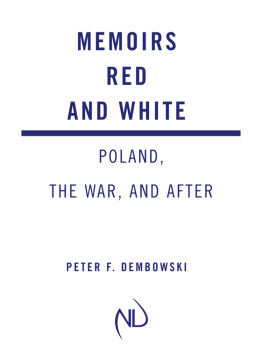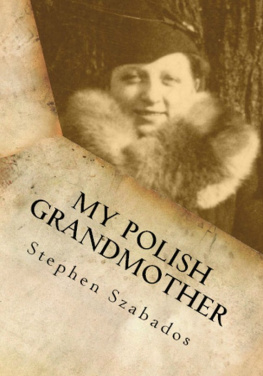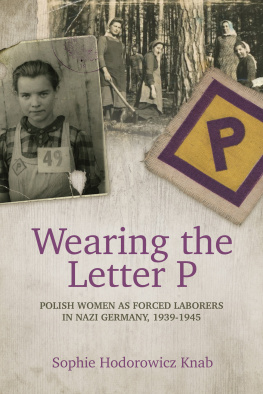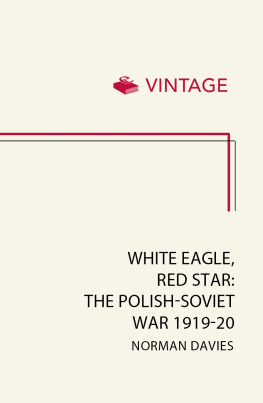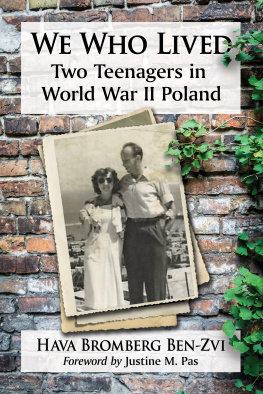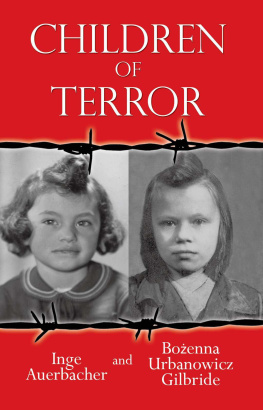Memoirs Red and White
POLAND, THE WAR, AND AFTER
PETER F. DEMBOWSKI
University of Notre Dame Press
Notre Dame, Indiana
Copyright 2015 by the University of Notre Dame
Notre Dame, Indiana 46556
undpress.nd.edu
All Rights Reserved
E-ISBN 978-0-268-07785-3
This e-Book was converted from the original source file by a third-party vendor. Readers who notice any formatting, textual, or readability issues are encouraged to contact the publisher at
To my children, Anna, Eve, and Paul
CONTENTS
After the publication of my book Christians in the Warsaw Ghetto (Notre Dame, 2005), I realized that my generation, the generation of the Second World War, was disappearing in an accelerated fashion. This should not have surprised me, but it did, and it led me to add my voice to the others of my generation. The first draft of my memoirs was written for my children and grandchildren. Some readers of that draft suggested that my reminiscences would be interesting to a more general public. In this book I have eliminated certain details of interest only to my family but left the majority of the text intact.
Like the Polish flag, composed of two contrasting colors, red and white, my memoirs are cast in red and white. Red treats largely my wartime life in Europe, life full of blood and death. My success in that part of my life was survival. White represents my successful migration and peaceful life in America.
Since I believe that I come from an interesting family, I describe its members in some detail. For some facts about my forebears, I consulted the writings of my mother, and for details concerning the death of my mother and my sister, I consulted materials published after 1989. Otherwise, there were no attempts on my part to conduct historical research or to engage the methods of academic writing. I began to write down my memories in the summer of 1998, and after many interruptions, I finished this work in the summer of 2014.
To provide a broader picture of the collective experience of my generation during that calamitous century, I mention my contemporaries as well as the members of my extended family. The experiences of my generation are important to Poland. The postwar Soviet government made considerable attempts to control recent history, to make it conform to the official Marxist historical truth. While these attempts were generally unsuccessful in Poland itself, I think that the Soviet propaganda had some influence outside that country. For instance, the often-repeated opinion that all, or almost all, of anti-Nazi resistance was inspired by the Communists entered more readily into the historical consciousness of the West than in Poland. I hope that my reminiscences will contribute to a more historically authentic picture.
NOTE ON POLISH NAMES AND ORTHOGRAPHY
Customarily, within the family and among friends, Poles use the diminutive forms of first names, given here in parentheses at first appearance. A relatively small number of first names are used, so to distinguish between various persons, many names have several diminutives. Thus Maria can be Marysia, Mania, Maka; and Anna, Ania, Anka, Anula; and so on. I use these diminutive forms when they seem to be easier to Anglo-Saxon eyes and ears. Thus I write Bronek, Franek, Kasia, Wodek, and so on, rather than Bronisaw, Franciszek, Katarzyna, Wodzimierz.
In Polish, c is always ts (even before k ); ch is h (horse); w is v ; j is y (as in yet); y is a short English i (bit); cz is ch (church); sz is sh ; szcz is shch (a shch urch); rz is zh (as in the French Jacques). There are three specific Polish vowels: is a nasal o , resembling the French on ; is the nasal e , French fin; and ; and u are always oo (tool). There are five specific consonants: (and c followed by i ) is a soft (palatal) ts (the Italian c iao); (and s followed by i ) is a palatal s ( s ure); (and z followed by i ) is a palatal z (plea s ure); is w ; (and n followed by i ) is the Spanish .
Red
The Old Country and War
BEGINNINGS
I was born in Warsaw on December 23, 1925, the son of Henryka (Henia) Dembowska ne Sokoowska and Wodzimierz (Wodek) Dembowski. My parents had three children before me: Katarzyna (Kasia), born July 30, 1919, who became Sister Zofia, a Franciscan in the Laski convent near Warsaw, and died there in 2002; Magorzata (Magosia), born February 26, 1922, arrested by the Gestapo on May 14, 1941, and executed, together with her mother, in the womens concentration camp at Ravensbrck on September 25, 1942; and Franciszek (Franek), born February 2, 1924, a retired geologist living in Krakw. The youngest member of our family, Bronisaw (Bronek), was born on October 2, 1927. He became a priest in the diocese of Warsaw in 1953 and was bishop of Wocawek from 1992 until his retirement in 2003.
Both of my parents came from landowning families of the old szlachta class, that is to say, the gentry. The gentry possessed a coat of arms and a long family history, both authentic and mythical. According to Jan Hempel, an ardent genealogist and family member (the husband of the daughter of my great-aunt), the Dembowski family can be traced to the beginning of the fourteenth century.
The szlachta class was a specific Polish institution. It should not be confused with the aristocracy, for only the very top of the szlachta constituted the true aristocracy. Before the partitions of Poland, at the end of the eighteenth century, the gentry were relatively numerous, constituting 20 percent of the population. They elected the king of Poland (who was automatically a grand prince of Lithuania), and they voted for the members of Parliament (the Sejm). After the last partitions in 1795, they played a leading role in all cultural, social, and national movements. They have been, in fact, a voice of national conscience. In the nineteenth century (above all, after the 186364 Insurrection) the szlachta class lost much of its economic power.
The descendants of szlachta families became the soul of the Polish intelligentsia. The Communists talked about Polish society of the 1940s and 1950s as a post-szlachta society, and quite rightly so. To give just one example, Lech Wasa, a peasant turned proletarian, talked, looked (his mustache, for example), and acted like a good old member of the szlachta; his opponent, General Jaruzelski, the last general secretary of the Polish Communist Party (KPP), was an authentic member of the szlachta and acted like one, in spite of his Communist role. The main characteristics of this post-szlachta intelligentsia class were a high level of Polish patriotism, absolute devotion to the idea of the independence of Poland, often combined with social and political progressivism, a sense of personal involvement, and a highly developed capacity for improvisation. I was born into this post-szlachta intelligentsia milieu.
MY FATHERS FAMILY
Both of my fathers parents were members of the landowning gentry, quite impoverished at the time of their birth. I do not remember my grandfather Aleksander, who died in the early 1930s. He was apparently charming, and, according to my cousin Jadwiga Dembowska, his grandchildren adored him. His brother Bronisaw (after whom my brother was named) was a pioneering ethnologist who discovered the folklore of the Gral people from the Tatra Mountains region and was the author of a dictionary of the Gral dialect. According to my mother, he belonged to the most creative group of the Polish intelligentsia. In the summer of 2009, a museum originally founded by him in Zakopane was officially opened as a state museum. Bronek, Franek, and Franeks children were guests of honor at this occasion. My grandfather had a third brother, Tadeusz, who was an outstanding surgeon and an active citizen of Vilna (Wilno).

